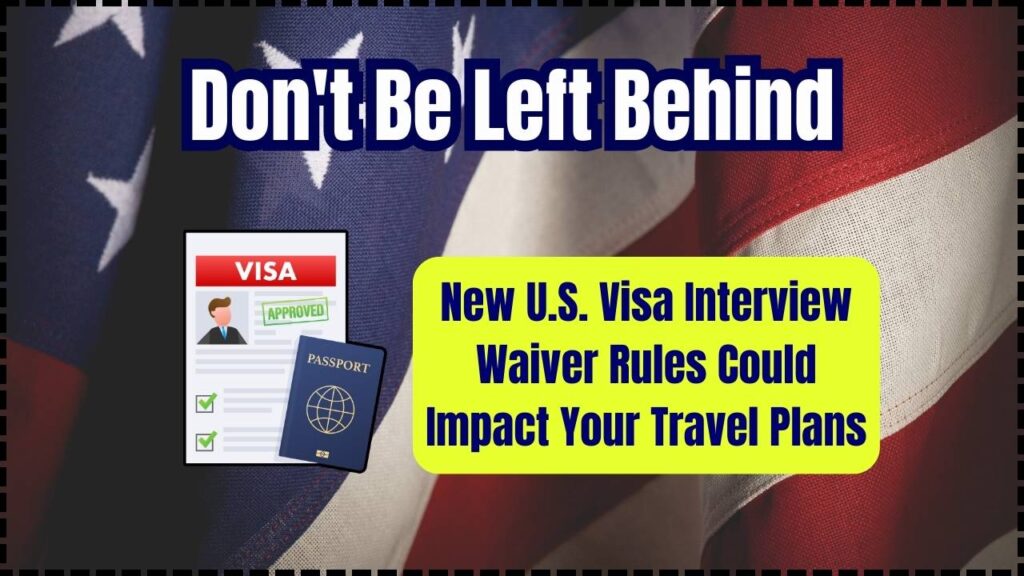New U.S. Visa Interview Waiver Rules Could Impact Your Travel Plans: In early 2025, the U.S. Department of State introduced significant changes to the Visa Interview Waiver Program, affecting millions of travelers and visa holders globally. These new rules narrow eligibility for applicants seeking to renew their U.S. nonimmigrant visas without an in-person interview. Whether you’re a business traveler, student, or skilled professional, understanding these new visa rules is essential to avoid disruptions to your U.S. travel plans.
New U.S. Visa Interview Waiver Rules Could Impact Your Travel Plans
The new U.S. visa interview waiver rules are a big shift for international travelers, students, and professionals alike. While the policy aims to tighten security, it may create hurdles for frequent travelers and those accustomed to the dropbox system. The key is early planning, staying informed, and understanding whether you qualify for the waiver or not. Proactive action now can save you from costly delays later—especially during peak travel and hiring seasons.

| Policy Element | Old Rule | New Rule (2025) |
|---|---|---|
| Interview Waiver Eligibility Window | Visa expired within 48 months | Visa must have expired within 12 months |
| Visa Category Requirement | Any nonimmigrant visa | Must be renewing the same visa category |
| First-Time Applicants | Some eligible | Most first-time applicants must attend interviews |
| Application Location | Any consular post | Must apply in country of nationality or residence |
| Previous Visa Refusal | Sometimes eligible | No eligibility if refusal wasn’t waived or overcome |
| Ineligibility Factors | Less strict | No waiver for potential inadmissibility (e.g., criminal history) |
What Is the U.S. Visa Interview Waiver Program?
The Visa Interview Waiver Program allows eligible applicants to renew certain types of U.S. visas without attending an in-person interview at a U.S. embassy or consulate. Instead, applicants can submit their documents via dropbox or mail, often speeding up the process.
Previously, this program benefited:
- Students (F-1)
- Tourists (B1/B2)
- Temporary workers (H, L, O visas)
- Exchange visitors (J-1)
- Family-based visa holders
The policy was relaxed during the COVID-19 pandemic to reduce in-person contact and manage staffing shortages. In 2023–2024, nearly 55% of U.S. nonimmigrant visas were issued without an interview.
But as of February 18, 2025, the rules are significantly tighter.
Why the Change?
According to the U.S. Department of State, the updated rule is aimed at:
- Improving national security
- Reducing fraud risks
- Ensuring higher scrutiny for eligibility and admissibility
Although consular resources have improved post-pandemic, the U.S. government now wants to reintroduce more in-person assessments.
Who Will Be Affected the Most?
1. Frequent Business and Tourist Travelers (B1/B2)
If your B1/B2 visa expired more than 12 months ago—even if you’ve had it multiple times—you must now appear in person.
Example:
A retired couple from India, who frequently visit their children in the U.S., will no longer qualify for the waiver if their last visa expired in 2023.
2. H-1B and L-1 Professionals
Tech workers and intra-company transferees are among the biggest users of the dropbox option. With tighter rules, they now need:
- Same visa class (e.g., H-1B to H-1B)
- Expiry within the past 12 months
- No previous visa denial
3. F-1 International Students
Renewing student visas from outside the U.S. during school breaks might now require more planning and in-person visits, especially if they changed institutions or lost status.
How to Determine If You Qualify for New U.S. Visa Interview Waiver (Step-by-Step)
- Check your last visa’s expiration date.
- If it expired within the last 12 months, move to the next step.
- Confirm you are applying for the same visa category.
- F-1 to F-1, B1/B2 to B1/B2, etc.
- Ensure your previous visa was issued with full clearance.
- No Security Advisory Opinions, no prior 221(g) administrative processing, etc.
- Make sure your last visa wasn’t refused.
- Unless that refusal was overturned or waived later.
- Apply from your country of nationality or residence.
Real-World Mistakes to Avoid
- Waiting too long to renew.
Many people assume they have 48 months. That’s no longer true. Start planning at month 10–11 before expiry. - Changing visa category during renewal.
Even if you qualify for a new visa (e.g., F-1 to H-1B), you cannot use the waiver. - Assuming dropbox means faster processing.
In many countries, dropbox applications can still face delays, background checks, or even be called in for interviews.
Practical Advice for Applicants
- Start Early: Book appointments at least 3–6 months in advance of travel.
- Stay Updated: Follow your local U.S. embassy or U.S. Travel Docs for region-specific procedures.
- Organize Documents: Ensure that your DS-160, passport, I-797 (if applicable), previous visas, and photographs are correct and valid.
- Monitor Processing Times: Use the State Department’s Visa Appointment Wait Times Tool.
No Interview Needed! US Visa Exemption Announced for These Indian Applicants
US Visa Renewal Update: America’s Interview Exemption Period Reduced by Months
Interview Waivers for Visa Renewals Tightened—Are You Still Eligible?
Frequently Asked Questions (FAQs)
Q1: Does this affect all visa categories?
A: No, it mainly affects nonimmigrant visas. Diplomatic (A, G, NATO), crew member (C1/D), and other special categories may still qualify under different rules.
Q2: I changed employers but my visa is still H-1B. Am I eligible?
A: Yes, if your previous visa was H-1B, and the new application is also H-1B, you likely qualify—if it expired within 12 months.
Q3: I was denied a visa years ago but later got approved. Can I still get a waiver?
A: Only if the denial was officially overcome or waived. Otherwise, no.
Q4: What if I apply from a third country?
A: Your waiver request may be denied. It’s strongly advised to apply from your country of residence or nationality.







